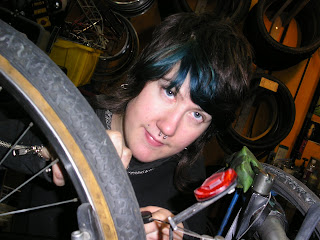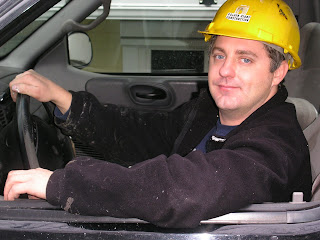Nick and the art of making coffee at Continental
 At Continental Coffee on Commercial Drive in Vancouver, it hasn't hurt business to have a Starbucks right across the street for the past 12 years.
At Continental Coffee on Commercial Drive in Vancouver, it hasn't hurt business to have a Starbucks right across the street for the past 12 years.“If anything it’s helped us in that it’s got more people drinking specialty coffee,” says Continental Coffee manager Nick Allan, who was only three months old when his grandma Anita opened the family café in 1979. “You get people opening up to the idea of espresso and the idea of having a specialty coffee and then they try ours and it’s better than Starbucks and it’s cheaper – so why would you go to a place that’s more expensive and not as good?”
The Continental tradition dates back a few generations to the town of Pietragalla, Italy where Nick’s great-grandfather’s grandmother served coffee to villagers seeking their morning perk. In 1926, his great-grandparents moved to Canada, and it is their Canadian-born daughter Anita (Nick’s grandma) who decided in 1979 to leave her job at the Commercial Drive branch of the Bank of Montreal and return to her roots in the family coffee business. And I am so thankful that she did it because Continental serves the best coffee ever – rich, full, soul-satisfying flavour with no trace of bitterness… My single-shot Americano with steamed milk is like… words elude me! ooh ahh… mmmmm… I’ve tried all the cafes on Commercial Drive in the past dozen years, and while there are a lot of good ones with appealing atmosphere, Continental reigns above them all!
(Let me digress for a moment to clarify something you might be wondering about… Nick’s last name: “Allan” doesn’t sound very Italian, does it? Well that’s because his grandma married a Scotsman and took his name. The Italian side of the family has the last name of Grippo.)
Anyways – back to the story… The reason Continental makes such awesome coffee at such a great price is because: a) they roast their own beans and b) Nick’s dad Rick and his uncle Jordan have been practicing the art of bean-roasting for more than 20 years after learning it from their great-grandfather. A few years ago, when they upgraded to a 12-kilo roaster, they moved their roasting operations out of the café and into their Burnaby warehouse. This made more space for the café, which now offers free, wireless internet to their sipping patrons. All coffee made and served at Continental is fair trade organic as are most of their beans to go.
“We do our own roasting and that takes out the middle man and gives us a bit more control over what happens in the cup,” Nick says. “It also allows us to charge a little bit less. I mean we could charge a little bit more and get away with it, but I don’t think we have to. We can afford to sell it for that.”
Many cafés start out in business with the mistaken idea that it’s easy to produce good coffee.
“It’s not as easy as just: ‘You buy the coffee, you roast it, and you brew it.’ It is an art form and it takes a certain amount of skill,” says Nick. “You have to know what you’re doing. If you look around at other cafes that are doing well – they’re producing coffee that’s better than Starbucks. If you’re producing on par or somewhere below, I think those are the cafes that are going to have problems. If you look at top notch cafes around Vancouver, we’re all doing well and that’s because we’re producing better than they’re producing.”
At 27, Nick has been working at Continental since he graduated from high school. He took over the manager position about three years ago.
“I’ve gone to school too, but I always ended up coming back here because it was what I knew and there’s nothing like being your own boss,” he says. “I can probably say that for me, being on the bar roughly every day for the past 11 years, I’ve probably had more coffee experience than 99.9 percent of the baristas in the city because most people don’t have this job for 11 years. And I’m passionate about it; I want to make the best cup that I can every time and I think that that shows.”
With an impressive memory for names, Nick guesses he knows the first names of about half the people he serves each day. During each fleeting interaction at the counter, he checks in with his regulars and keeps up to date with their news of life.
“My favorite part is getting to interact with people and getting into these two or three-minute relationships where you learn about their day and you learn how they’re doing and you kind of start them off with what ever it is. I don’t know – maybe it’s like overstating what I’m doing – but you’re getting them started on their day,” he says. “I do care for people and I think it kind of shows. It’s not a phoney kind of thing and I think a lot of people appreciate that. When they come in and I ask how they’re doing, I genuinely want to know – and if they’re not doing well, tell me and I’ll try to give you a coffee and hopefully that will make it better.”
One challenge of the job is the occasional need to deal with unlucky people who’ve had the misfortune of being whacked in the head with the bad manners stick.
“They tend to treat you like you’re somehow less than human because you’re standing on the other side of the counter – like you might as well be a coffee robot or a trained monkey. They don’t even treat you like a person. But those people thankfully are few and far between and I don’t even get them every day,” Nick says. “It’s just if the line-up at Starbucks is too long, they’ll come over here or they’ll drive up in their SUV and they’ll drive away once they have their coffee.”
Nick describes another challenge of working with the public, which will probably sound familiar to anyone who has ever worked in the service industry (or been sneered at by crabby workers who seem to hate their jobs).
“If I’m having a bad day or if I’ve broken up with a girlfriend or whatever it is – I didn’t sleep the night before – I have to be as happy and ‘on’ as those days when I am naturally feeling outgoing. It can be a challenge not to project it onto someone else when I’m having a bad day,” he says, describing the cheerful influence he gets from the people around him. “When I first get here, I have my coffee and kind of get warmed up and ready to go – and even if I’m having a bad day, usually some one will come in and say: ‘That’s a great coffee’ or they’ll usually say something that’s going to get me in a good mood – even on those days when I don’t necessarily feel like being here, which everyone has.”
Nick plays ice hockey and mixed martial arts in his off-hours. “It’s my nice relaxing time to get my service industry angst out on the ice or over in the ring,” he says with a laugh. “I try to get to the gym as much as I can – especially at this time of year to burn off some of the chocolates.”
And speaking of “this time of the year” – I’d like to wish a Happy Holiday to you my dear readers. Thanks for checking out my blog and please do let me know if you would like to be or suggest a Super Citizen for 2007.
In the meantime, if you’re looking for the ultimate coffee experience, please do visit Continental Coffee at 1806 Commercial Drive (at 2nd Avenue). Be careful though – it’s addictive…
Technorati tags
coffee
cafe
coffee shop
Commercial Drive
coffee beans
roasting coffee
family business
Starbucks
Vancouver
B.C.
espresso




